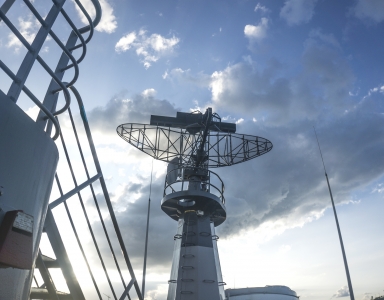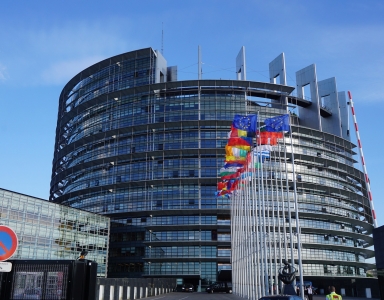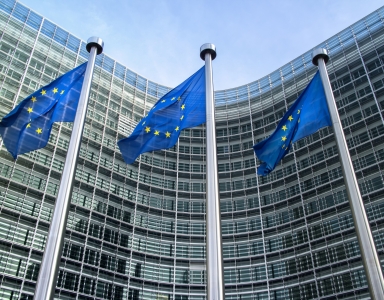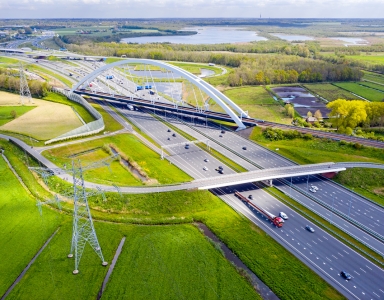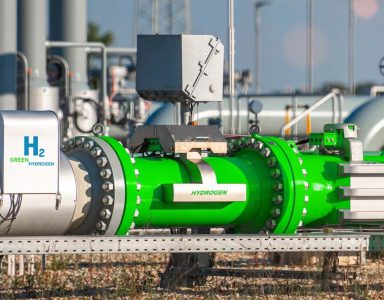EU grants: a solid base for spending billions on defence
Vis pacem, para bellum. The underpinnings under the gargantuan budget increase go back millennia. If you desire peace, prepare for war. Well, that’s exactly what Europe is going to do. If we assume that all EU member states will adopt the 5%-spending norm and that the current average lies on 2% of the EU GDP of € 17 trillion, then the EU combined defence spending will grow from about € 326 billion in 2024 to give or take € 850 billion in 2035. That is a tremendous amount of money to spend on a sector that has, after the Berlin wall came down, been shrinking and shrinking and shrinking. On top of that, we also want to increase our spending in Europe, whereas in recent years we have been spending more and more money in the US. (52% of EU defence spending of EU NATO countries was done in the US in 15-19, increasing to 64% in 20-24).
Complicated assignment
The assignment is clear. Invest more, preferably on our own continent, with more coherence and collaboration. That should lead to less variation in weapons systems and better interoperability to assemble a more decisive defence. (Good luck, on a continent where populist powers would rather see money spent poorly amongst themselves than spent well at a neighbour. But that aside). Earning money well is an art but so is spending money well. A number of factors make it difficult to spend the mega-investments effectively:
- When we now invest in the lessons we learn from the war in Ukraine, we are preparing to win the previous war. What we instead need to invest in, is an industrial base that excels in adaptability and change. It is called survival of the fittest, not survival of the strongest, for a reason;
- The purchasing departments of defence ministries are just as dressed down as the rest of the armed forces and may lack the expertise, experience, and size to tackle this job;
- Manufacturers need clarity, time and confidence to make the required investments. As a rule, they shy away from setting up a production line consisting of multiple factories for just the one order. Long negotiations leading to short-lived contracts and specifications that keep on diverging are a source of frustration and delay.
How not to re-invent the wheel
So, Europe has its work cut out. Still, we do not have to start from scratch and reinvent the wheel. European countries and the EU have at their disposal some properly developed channels for effectively and efficiently spending large sums of money: EU grant programmes. And with that, I do not mean just the text on a web site and a template for a project plan and budget, but mostly this: a solid legal basis that has been worked on for years, combined with existing and staffed executive agencies and audit services that contain a host of knowledge on how governments can reasonably effectively and quite efficiently provide funding to companies to align their activities with societal needs. (I say reasonably and quietly, because as a grant specialist, I obviously get to see some examples of where bureaucracy slows things down).
The European Defence Fund Is a logical starting place. This programme targets R&D for defence and cooperation in defence activities in EU countries. As EU funding programmes go, this is a small one with a budget of € 7,3 billion for the 2021-2027 period.
For stimulating the development of an adaptive industrial base, the EU has programmes in place like Horizon Europe, the big fund for R&D with roughly € 96 billion allotted to the same seven-year budget period. But also, the Innovation Fund that manages € 40 billion and that targets first industrial deployments of technologies for green industries, could serve as a blueprint for industrial developments in defence.
In order to support the growth of start-ups and scale-ups that bring promising disruptive technologies, the European Innovation Council (EIC) has been developed as part of Horizon Europe. EIC, with a seven-year budget of ca € 10 billion, provides grants, business development support and equity to provide a space for disruptive technologies to grow and mature.
To assist in fostering confidence among producers to elicit investments, one could learn from auction-like grants and contracts for difference such as the hydrogen auction. Here, companies bid to the level of public support they deem necessary to deliver a certain good. The best bids win.
For infrastructure, whether it is energy, data or transport, the EU has the Connecting Europe Facility (CEF) in place that manages about € 33 billion. This programme already has a military component and can quite easily be used to spend the 1,5% of GDP earmarked for projects that support defence purposes but are not military hardware.
By the way, I only mention the amounts of money involved in these programmes to indicate that the organisations behind them are used to acquire, manage and audit a portfolio of large projects.
Tough choices remain
Even though there may be routes available for spending, it will not be easy. The defence-related budget increases will lead to moral and often painful choices, both within European NATO countries as in their relations with the outside world. Every euro spent on defence or related projects, can (no longer) be spent on health care, education, welfare,… Obviously new jobs will be created. And definitely, transport and trade will benefit from better (rail)roads. But a euro spent on education provides far greater returns on investment. And cutting costs in healthcare may sound good from a bookkeeper’s perspective but imagine going to the hospital with a loved one only to hear that a life-prolonging treatment is no longer reimbursed.
“In Dutch, we like to say that ‘the strongest shoulders carry the heaviest loads’, but in practice, budget cuts hit vulnerable people hardest.”
Moreover, a stronger, more self-confident Europe should not lead to a moral laziness in which we leave the rest of the world to sort out the mess. Even defensive systems can be weaponized. Excellent air defence protects civilians, sure. But in the wrong hands, it lowers the threshold to go to town on a rival nation that is less capable. Might should not make right. In international relations, one often speaks of 3D: Development, Diplomacy and Defence. The idea is that all three are equally important. Everything is connected. So, it makes total sense to improve our defence, but it should not go at the expense of Diplomacy an Development and their institutions that foster relations and support co-development. The professionals in embassies and development agencies are just as important to a safe and prosperous Europe as are the rocket scientists working on armaments.
Conclusion
TLDR: spending money well is harder than it sounds. Fortunately, the European NATO allies and the EU already have a lot in place of what is needed: a solid legal base and competent authorities that combine a lot of experience and know-how for managing portfolios of large civil project. I think we can make good use of that experience to effectively and reasonably fast get to a safer Europe. But let us never forget that military might alone does not lead to a better world!

